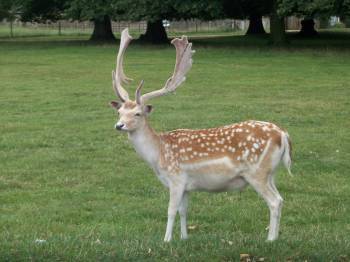Staff profile

| Affiliation | Telephone |
|---|---|
| Visitor in the Department of Biosciences |
Biography
Current Research Project

I am currently working on an AHRC-funded project entitled “Dama International: Fallow Deer and European Society”.
Native fallow deer populations are endangered with their occurrence being restricted to south-western Turkey. In contrast to the native populations, artificially introduced populations can be found in many regions worldwide. These populations have been selectively transported by humans over the course of the past two millennia. Indeed, fallow deer are an iconic species that today are a common sight in many parks and stately homes across Great Britain. The successful story of fallow introductions can provide important insights into human population movements, trade and ideology with the potential to provide cultural evidence of the highest quality and relevance for a range of disciplines and audiences.
My current research uses genetic data to gain information regarding the origins and movement of fallow deer. In order to achieve this, both ancient and modern DNA is being extracted from fallow deer sampled from a wide range of European locations. This research forms part of a larger, multi disciplinary, project that collaborates with the Archeology department at the University of Nottingham.
Fallow Deer Project Links
http://www.fallow-deer-project.net
Follow the fallow deer project on twitter:
https://twitter.com/#!/DeerProject
Past Research Project
Prior to becoming a member of the team on the fallow deer project, I carried out my PhD on the population genetic history of British roe deer populations. The population genetic history of this particular mammalian species was a useful model for addressing issues central to conservation genetics including the impacts of bottlenecks and re-introductions.
Publications
Publications
Scientific publications
Baker, K. and Hoelzel, R. (2014) Influence of Holocene environmental change and anthropogenic impact on the diversity and distribution of roe deer. Heredity, (6):607-15. doi: 10.1038/hdy.2013.142
Baker, K. and Hoelzel, R. (2013) Fluctuating asymmetry in populations of British roe deer (Capreolus capreolus) following historical bottlenecks and founder events. Mammalian Biology, (5) 387-391. doi:10.1016/j.mambio.2013.02.001
Baker, K. and Hoelzel, R. (2012) Evolution of population genetic structure of the British roe deer by natural and anthropogenic processes (Capreolus capreolus). Ecology and Evolution,(1) 89-102. doi: 10.1002/ece3.430
Barlow, A. Baker, K., Hendry,C.R., Peppin, L., Phelps,T., Tolley, K.A., Wüster, C.E., Wüster,. W. (2012) Phylogeography of the widespread African puff adder (Bitis arietans) reveals multiple Pleistocene refugia in southern Africa. Molecular Ecology, (4) 1134-57. doi: 10.1111/mec.12157.
Sykes, N., Baker, K., Carden R., Higham T., Hoelzel, R. and Stevens, R. (2011). New evidence for the establishment and management of the European fallow deer (Dama dama dama) in Roman Britain. Journal of Archaeological Science, 38 (1) 156-165. doi:10.1016/j.jas.2010.08.024
Non peer reviewed publications
Baker, K. (2012) A window on the past. Deer, 16 (3), 22-24.
Baker, K. (2011) The fall and rise of the British roe. Deer, 15, (8), 10-13.
Baker, K. (2008) Roe: Ancient and Modern, Deer, 14 (7), 25.
Publications
Journal Article
- Conservation genetics of the European fallow deer: a reply to Marchesini et alBaker, K. H., Gray, H. W., Pekşen, Çiğdem A., & Hoelzel, A. R. (2021). Conservation genetics of the European fallow deer: a reply to Marchesini et al. Mammalian Biology, 101(3), 313-319. https://doi.org/10.1007/s42991-021-00121-6
- Demography and adaptation promoting evolutionary transitions in a mammalian genus that diversified during the PleistoceneDe Jong, M., Li, Z., Qin, Y., Quemere, E., Baker, K., Wang, W., & Hoelzel, A. (2020). Demography and adaptation promoting evolutionary transitions in a mammalian genus that diversified during the Pleistocene. Molecular Ecology, 29(15), 2777-2792. https://doi.org/10.1111/mec.15450
- Variation in the prion protein gene (PRNP) sequence of wild deer in Great Britain and mainland EuropeRobinson, A. L., Williamson, H., Güere, M. E., Tharaldsen, H., Baker, K., Smith, S. L., Pérez-Espona, S., Krojerová-Prokešová, J., Pemberton, J. M., Goldmann, W., & Houston, F. (2019). Variation in the prion protein gene (PRNP) sequence of wild deer in Great Britain and mainland Europe. Veterinary Research, 50(1), Article 59. https://doi.org/10.1186/s13567-019-0675-6
- Ireland's fallow deer: their historical, archaeological and biomolecular recordsBeglane, F., Baker, K., Carden, R., Rus Hoelzel, A., Lamb, A., Mhig Fhionnghaile, R., Miller, H., & Sykes, S. (2018). Ireland’s fallow deer: their historical, archaeological and biomolecular records. Proceedings of the Royal Irish Academy. Section C, Archaeology, Celtic Studies, History, Linguistics, Literature., 118C, 141-165. https://doi.org/10.3318/priac.2018.118.01

